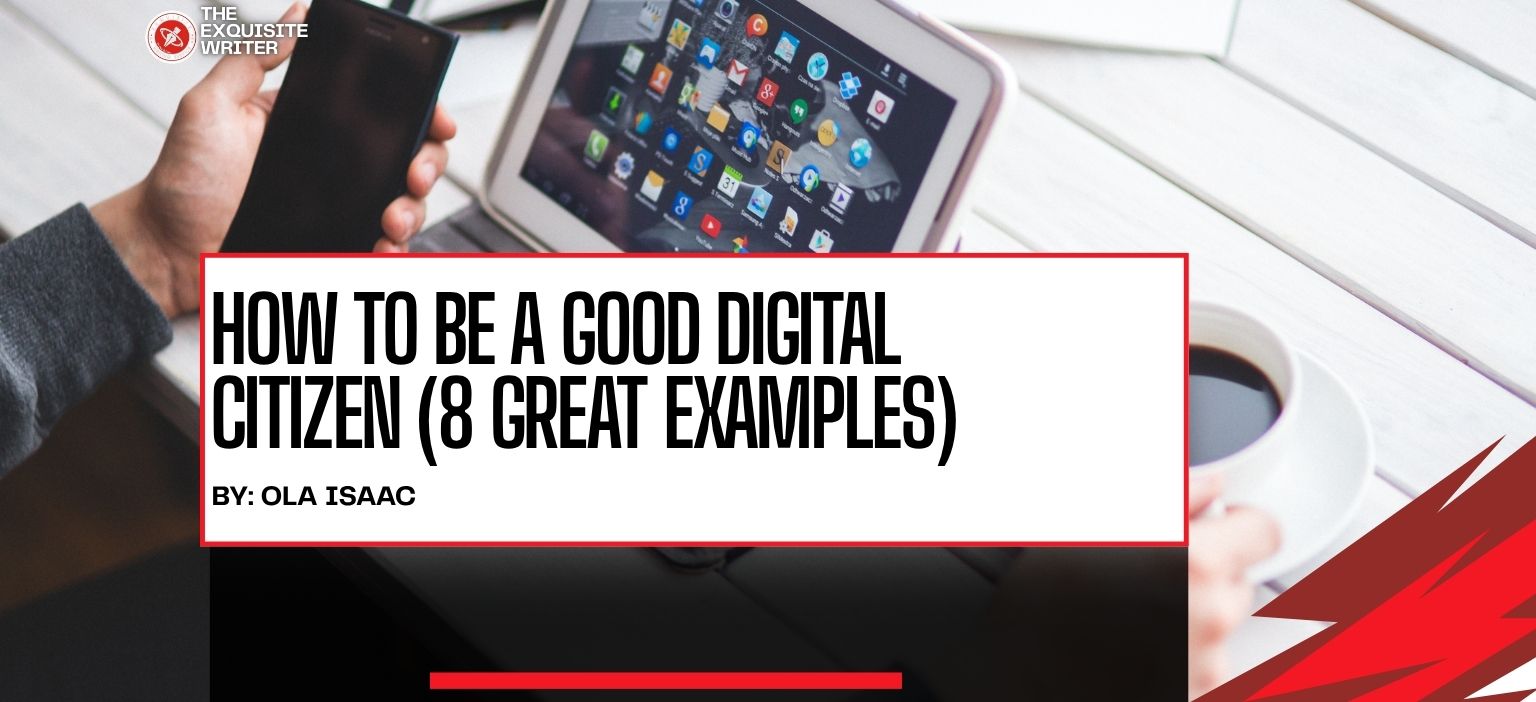Got a social media account? Love shopping online? Awesome!
You are in the right spot to learn how to be a good digital citizen!
You see, the convenience of the Internet—for communicating, starting a business, learning, and entertainment—comes with great responsibility.
Did you know that teens and adults spend more than four hours online daily? That’s why learning good digital citizenship habits has never been more important.
In this article, you will explore impressive tips on how to be a good citizen.
The Exquisite Writers have compiled 15 vital skills every digital citizen must have. They are for all ages and groups—students, parents, educators, and caregivers.

What Exactly is a Digital Citizen?
In simple terms, a digital citizen uses the internet regularly and embraces all the information technology offers.
Now, how can you be a good digital citizen?
Let’s talk about the skills a digital citizen must have.
12 Tips on How to Be a Good Digital Citizen
Here are 12 skills to help you learn how to be a good digital citizen:
1. Think First, Think Again
Before you post on any social media platform, the first thing to do is to think.
With social media, sharing information or details behind the screen might be easier than in real life.
So, how do you practice thinking before posting? Here are some questions to think about:
- Would I say this statement in person, whether chatting with a friend, attending a class, or meeting? A good digital citizen should consider this question and perspective to build a well-balanced use and presence on the internet.
- Are my emotions high? Don’t post on your social media account if your emotions are high. If you are careless, your emotions can get the best of you!
Yes, this is how to be a good digital citizen!
2. Do Not Overshare
When sharing information on the internet, especially personal ones, it’s vital to err on the side of caution.
Finances, location, full name, and other information that makes strangers track you down shouldn’t be shared online.
We enjoy documenting all that happens to us, especially the experiences we find pretty heartwarming.
But be careful; you might be giving fraudsters access to your identity.
3. Prioritize Your Privacy
Stay on top of your privacy settings. The world doesn’t have to know everything about you.
Of course, you could worry about not using the features of a particular platform to the brim.
But let’s face it—you don’t have to unless you are running a business and you want your physical store to be known by your online audience, adding credibility to your business.
At The Exquisite Writers, we suggest that you evaluate your privacy settings on all your social media accounts every six months.
4. One Search Engine Isn’t Enough
Most people’s go-to search engine is Google, but trying other search engines is essential when learning how to be a good digital citizen.
For example, explore some options, especially when typing in your information.
Use anonymous search engines like Swisscows, Startpage, or DuckDuckgo.
This will limit the amount of your search history clicked on or shared.
5. Protect and Regularly Change Your Password
Hackers always look for vulnerabilities, including using the same password for years.
As a digital citizen, learning how to be a good digital citizen, keep your password secure and regularly change it so hackers cannot access your information.
Recommendation: We suggest you create a unique login detail for each website.
6. Check the Source of Your Information
The rush to click the “share” button is common online.
It’s not out of place to receive a message and ask the sender if he knows the source.
Oftentimes, the response is: “No, I don’t. Someone sent it to me.”
While the gestures are well intended, they are a quick way to spread misinformation and steal private data. How bad is that?!
Thus, it’s recommended that you verify the source of information before spreading it.
You can check websites like Snopes.com or FactCheck.org to verify the accuracy of viral news or claims.
A quick check online can be sufficient. You might be surprised by what you find.
Make it your goal to let unverified news or information stop at your table.
Yes, that’s one key answer to your question: How can I be a good digital citizen?
7. Report Poor Behavior or Illegal Activities
Another key part of being a good citizen on the internet is reporting suspicious activities.
Cyberbullying is also common, and you can do your part to stop it or prevent further chaos.
When you spot a phishing account or activity, report the account immediately.
Raise the alarm, whether in the group or anywhere else.
How about cyber bullying? Do the same, whether they are harassing someone else or posting something illegal.
Interestingly, they don’t have to know you did. So, your confidentiality will be preserved.
8. Consider How Your Actions Affect Others
Now, let’s talk about you—the digital citizen!
While you should watch what others are doing, you should also monitor your actions.
As a good digital citizen, you must know that your actions online, whether good or bad, affect others. And it can be both positive and negative.
Stop and steer clear of cyberbullying, hate speech, disrespect, and denigrating comments. And yes, do not troll!
If you live by this, you are creating a haven for you and other users on the internet.
9. Protect Your Time
You’d have been guilty of this:
“Spending hours scrolling on your favorite social media! Perhaps you’ve told yourself: By a certain time you’d log out. But surprisingly you found that you’ve spent hours and hours surfing the social media app.”
Let me remind you that social media is good at helping people waste their time.
You want to spend time online to stay informed or check up on loved ones. Well, it’s good! But do your surfing with intention. Do not mindlessly surf the internet.
When you are on the internet, be sure you are there for a reason. Here are some ideas:
- Want to relax with it? Set a time.
- Want to learn about a recent happening? Do it within a time limit. Your time is precious; use it well, and don’t waste it.
10. Learn How Copyright and Creative Right Works
Art, essays, videos, or any other creative works are features of the internet.
Hundreds, thousands, or even millions can see with a single click.
Unfortunately, this easy share has made stealing ideas and content much more common and easy.
According to the World Intellectual Property Organization (WIPO), online copyright infringement has increased significantly over the last decade, making awareness more vital than ever.
Hence, you must know about copyright if you create or consume online content.
Just because you can edit an item, place music on a video, or add a character to a shirt does not mean it’s legal.
So, embrace the literacy of online copyright to confirm whether you are not infringing on someone’s creative ownership, especially if you are making money off it.
Learn more from WIPO’s copyright basics.
11. Keep Security Top of Your Concern
To know how to be a good digital citizen, you just wouldn’t want to be carefree when online. The internet is a good place.
At the same time, it can be a dangerous place. Therefore, security must be at the top of your concern when learning how to be a good digital citizen.
To achieve that, keep all your software up to date. Also, avoid clicking on just any links.
If you must access a link, copy and paste it into your browser. If you have an antivirus software, keep it up to date.
12. Establish a Healthy Offline and Online Balance
Technology can affect our mental and physical well-being. For example, do you text and drive? Do you scroll through social media rather than sleep? Do you pay too much attention to what people say about you online?
Not creating balance in these instances can have detrimental effects.
While technology is helpful, not creating balance can harm you!
Check the statistics for the many accidents that result from using a phone while driving. Also, check the stats of the side effects of sleep deprivation.
The cons outweigh the pros.
If you love digital flexibility, check out our Simple Writing Jobs From Home: 9 Ways to Earn Extra Cash
Apps For Digital Citizen
Some apps help your kids master the art of being good digital citizens. These user-created tools have become indispensable for digital citizens.
In this bullet list, you will explore these apps. They are not only highly useful but also offer great Minimalist design.
These resources can help educators teach all the skills highlighted regarding how to be a good citizen in this article and help individuals master the skills, too.
1. Common Sense Media Digital Passport (CSMDP)
Designed for students in their 3rd to 5th grade. It uses fun, interactive internet-based games, modules, and videos to teach digital citizenship.
2. Common Sense Media Digital Compass (CSMDC)
Designed for 6th – 8th grade students, they can learn how to make the right online choices.
3. Digital Citizen App
Designed by learning.com, these apps work for a wide array of work. There are videos, quizzes, and games that will teach online safety and address cyberbullying.
4. Global Digital Citizen Foundation
It’s home to extensive resources for educators to help kids learn how to become digital citizens.
5. Cyberwise
It’s an online resource that includes all the needed digital citizenship tools teachers can use. You can also find lesson plans and more.
6. Webonauts Internet Academy
This websites helps little kids make respectful and responsible decisions in their online interactions.
7. Trace My Shadow
It is a website that allows both young and old to get a glimpse into some of the digital traces they are leaving online. It explains what kind, how many, and from what devices.
Final Thoughts
It’s hard not to surf the internet these days. But it’s not hard to learn how to be a good digital citizen.
The digital citizenship skills discussed in this article will make all the difference and lead to a fun, healthy, and safe time.
Of course, the internet is a public space, and your actions have consequences.
Therefore, be mindful of what you do online and use the internet—and everything it offers—reasonably!
Want to explore more guides like this? Visit our blog for inspiring tips on digital life, writing, and productivity.

